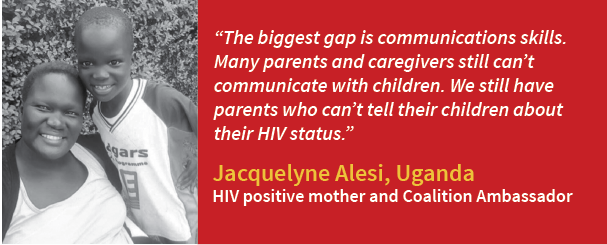Interview with Coalition Ambassador Jacquelyne Alesi
As a young mother in Uganda, Jacquelyne Alesi set up and, until very recently, ran Uganda Network of Young People Living with HIV&AIDS (UNYPA). She also is the young person representative helping to design Uganda’s national guidelines for psychosocial support for people affected by HIV. In 2016, Jacquelyne was nominated for a global award to people under 40 championing family planning.

My experience
I am HIV positive and have been living with HIV for the past 15 years. I have an eight–year-old son who is HIV negative. I told him myself that I am HIV positive – it is one of those experiences that any mother would not want to have. My son knows I am always on TV, the radio, and in the media. I didn’t want him to get that from those places. I am trying as much as possible to be in control. The most important thing is for you, as a parent, to be the one to tell your children about your HIV status before anyone else does.
After I told him, his school called me. This is already stigma – for them to be concerned more about my health than about treating my son the same way every other student is treated. It is important to make my son feel that my HIV status is not an issue at school.
Today, my son is at boarding school. He is healthy; he is the best in class!
Being HIV positive also affects job opportunities. Once, when I applied for a job and was being hired for the position, I told human resources that I would need some days off for treatment. She asked, “What do you mean?” I told them that I am HIV positive and she asked “Why didn’t you tell us?” She told me I was supposed to write it on my CV. That is very traumatizing. I quit the job immediately; I could not work in such an environment.
When I started UNYPA, it helped me to connect with other people and to get a better understanding of myself. Later, I went back to this same organization and they wanted me back. I said yes because that experience helped me to learn about myself. But just imagine another young person who has been stigmatized that way. Stigma happens everywhere.
The Coalition seeks the same things for children and HIV that I do
I left UNYPA because I want the young people to take it on themselves. I decided to resign to let another young person to take on a leadership role. I believe in taking risks and taking on new assignments. When this opportunity knocked, I thought “This is what I have been crying for! This is something I have always wanted to do.”
Having this role is a dream come true. I wanted to expand on and share my experience globally. This role really matches my priorities and is something I feel is very important. If we get more Jackies to tell their stories, I think we can reach further.
The most important change I would like to see to help children affected by HIV and their caregivers
The biggest gap is communications skills. Many parents and caregivers still can’t communicate with children. We still have parents who can’t tell their children about their HIV status. It’s like having someone else telling your child about sex. If it were you, as a parent, speaking with your children, it would be much better. But disclosure is a problem we still have. This is the biggest thing I think needs to be changed.
What gives me the most hope
I am hopeful that we will have just one pill for HIV positive children. I take two tablets and I already feel like I am taking a lot. If we, as adults have that feeling, how must children feel?
If there were an injection that could be given annually or quarterly to children with HIV, this will be very good. I see where we are going and it gives me hope.
The one message I want people to know about children affected by HIV
If you want to get somewhere, you need to move together. When you want to move farther, you need to move as a team. Most importantly, let children be children; and let parents be responsible.